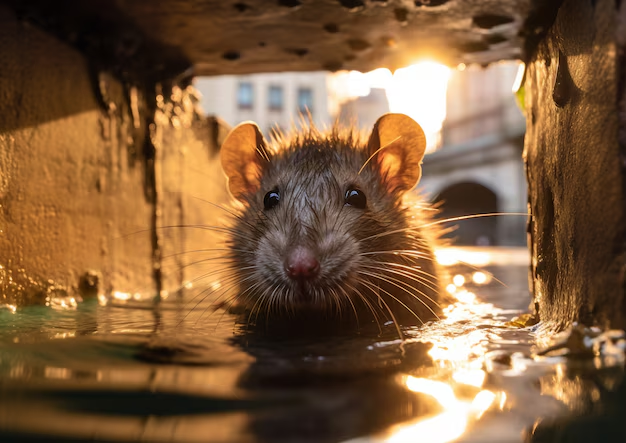Can Mice Really Get Inside Your Refrigerator? What You Need to Know
Have you ever opened your refrigerator, perhaps intending to investigate a mysterious late-night noise, only to find yourself pondering an unsettling question: "Can a mouse actually find its way into my fridge?" It's a fair query that many homeowners might find themselves wondering about, especially those who have battled with rodents in their living spaces. In this comprehensive exploration, we'll delve into whether mice can infiltrate your fridge, why they might want to, and what effective steps you can take to prevent it.
Understanding Mouse Behavior and Capabilities
How Mice Navigate Their Environment
Mice are small, resourceful creatures with an impressive ability to navigate tight spaces. Their flexible bodies allow them to squeeze through openings as small as a quarter of an inch, meaning entry into many areas can be easier than you might assume. This capability is one of the reasons they are such persistent pests in homes.
Motivations for Mice Entering a Refrigerator
While it may not seem like an obvious target, a refrigerator could potentially house food smells that attract mice. There are several reasons they might attempt to enter:
- Food Source: Mice are driven by the search for food. Any easily accessible scraps or poorly stored food can serve as an invitation.
- Warmth: Despite the cold interior, the mechanics of a refrigerator generate heat, especially around the motor, providing a cozy spot for a mouse.
- Shelter: Mice seek out secluded areas to avoid predators and humans—spaces like the kick-plate zone at the bottom of many refrigerators can seem ideal without proper maintenance.
Can a Mouse Physically Get into a Refrigerator?
Barriers to Entry
Modern refrigerators are designed with seals and barriers intended to keep the cold air in and pests out:
- Gaskets and Seals: The rubber gaskets surrounding a fridge door create a tight seal, making it difficult for air (and mice) to enter.
- Structural Design: Fridges are made with solid metal or plastic exteriors, which mice typically can't penetrate.
Despite these defenses, a few specific conditions could provide an entryway:
- Damaged Seals: Wear or damage to door seals might provide a gap large enough for a curious mouse.
- Poorly Installed Units: Installation errors could leave gaps between the fridge and surrounding cabinetry.
Indirect Routes: The Back and Underneath
Mice are more likely to interact with the rear or bottom areas of a refrigerator rather than the inside:
- Warm Motor Sections: As mentioned, the back of the fridge, where the motor generates heat, can attract mice seeking warmth.
- Access Underneath: Gaps underneath the fridge, often hidden from sight, might not provide an entry to the inner compartment but can allow a mouse to nest or chew wires.
Steps to Mouse-Proof Your Fridge Area
Preventive Measures
Inspect and Repair Seals: Regularly check the rubber gaskets for signs of wear or damage, and replace them if needed.
Proper Fridge Installation: Ensure your refrigerator is correctly installed without gaps; insulated panels or filler strips can be used to close any spaces.
Routine Cleaning: Keep the area around, underneath, and behind your fridge clean to eliminate food residue and discourage nesting.
Seal Gaps in the Home: Beyond the kitchen, inspect your entire home for potential entry points. Seal cracks in walls or floors, and ensure windows and doors close tightly.
Use of Deterrents
- Natural Repellents: Substances like peppermint oil can repel mice. Small cotton balls soaked in these and placed around the kitchen can deter entry.
- Electronic Pest Repellers: Some devices emit ultrasonic waves designed to be unpleasant to mice.
What to Do If Your Fridge Area Is Invaded
Identify the Problem Area: Look for droppings or signs of chewing around the refrigerator. Listen for noises that might indicate rodent presence.
Professional Help: Engage a pest control professional if the problem persists or if an infestation is suspected. They can offer targeted advice or interventions.
Sanitize Thoroughly: Clean areas where mice have been sighted with disinfectant to remove trails and odor signatures that might attract other rodents.
Additional Considerations for Effective Pest Control
Integrating a Holistic Home Defense Approach
A refrigerator isn't the only target for mice. Protecting your home requires a comprehensive approach:
Outdoor Maintenance: Keep yard debris away from the house and maintain a clean perimeter to discourage infestations.
Food Storage: Use airtight containers for pantry items to ensure no food smells entice animals indoors.
Regular Monitoring: Set traps and check high-risk areas regularly to catch problems early before they escalate.
Understanding Mice Behavior for Better Prevention
Mice are resourceful and follow their primary needs—food, warmth, and shelter. Understanding their behavior is crucial for preventing an infestation. They are nocturnal and typically remain hidden, making early detection challenging but essential for control.
Summary: Key Takeaways for Keeping Mice at Bay 🐭
- 🔍 Inspect regularly: Check fridge seals and installation for any possible entry points.
- 🛠 Repair damage: Address any identified issues, including sealing gaps around your home.
- 🌿 Use repellents: Natural deterrents can be an effective tool for discouraging mice.
- 🐾 Monitor activity: Keep areas around the refrigerator clean and regularly inspect for signs of mice.
- 📞 Consult experts: If an infestation occurs, professional help may be necessary.
Understanding the capabilities and motivations of mice, coupled with strategic preventative actions, can keep your refrigerator—and the rest of your home—mouse-free. By implementing these measures, you'll not only protect your food but also contribute to a safer and more hygienic living environment. Remember, while a mouse might not frequently manage to get inside your fridge thanks to its design, the surrounding area can still be an attractive spot for these clever invaders. Practicing vigilance and maintenance is your best defense.

